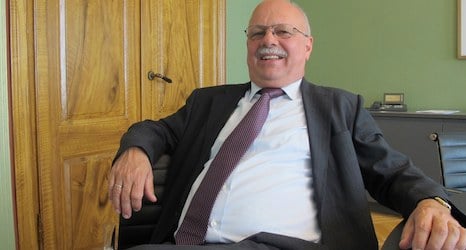Konrad Hummler, in an interview published on Thursday, took full responsibility for the closure of Wegelin & Co., founded in 1741, after it paid US penalties of $57.8 million for helping clients avoid some $20 million in taxes.
Wegelin, the first non-US bank to plead guilty to tax evasion charges in the United States, essentially wrapped up operations in late January 2012, selling its non-US business to the Notenstein bank, since bought by Swiss banking group Raiffeisen.
"There was a feeling of invulnerability, " Hummler, who led the bank for more than a decade, told the Weltwoche magazine.
"I was often at the heart of the game."
He acknowledged he had underestimated the US authorities and the risk of penalties.
While stressing the bank had always respected Swiss law, he admitted exploiting "differences between the (legal systems) in Switzerland and the United States."
In a more globalized world, "the banker has been made more responsible than his client for the payment of the client's taxes," said Hummler, famous for bombastic opinions and his long-time support of tax exiles and Swiss banking secrecy.
He defended going into tax exile if there is a risk of property confiscation.
"That is not the case in the United States, but it has been the case in other countries, especially in Europe, as history has shown us," he said, in an apparent reference to the Nazi confiscation of Jewish property during the Second World War.
The "European environment" surrounding non-EU member Switzerland "carries some of the historical blame for the existence of banking secrecy," he said.
"Without state expropriation and the destruction of cultural heritage provoked by political errors in Europe, banking secrecy would never have seen the light of day" in Switzerland, he said.
The secrecy policies did allow many Jews to stash funds away from the Nazis during the war, but Swiss banks have also been accused of keeping assets owned by Holocaust victims and making it difficult for their heirs to track down the money.
Under a 1998 accord, the banks paid a $1.25 billion settlement into a fund that has just finished paying out compensation to some 457,000 Holocaust survivors and heirs.
Wegelin is, meanwhile, not the only Swiss bank to have faced the music in Washington over using Swiss banking secrecy to enable Americans to stash assets out of reach of the US tax authorities — an issue that came into sharp focus amid the financial crisis
Switzerland's biggest bank, UBS, agreed in 2009 to pay an out-of-court fine of $780 million for helping Americans dodge their taxes, and 15 other Swiss banks remain in US sights.
The Swiss government has been working hard to settle the bitter dispute with Washington without completely lifting the country's long-sacrosanct banking secrecy practices.



 Please whitelist us to continue reading.
Please whitelist us to continue reading.
Member comments